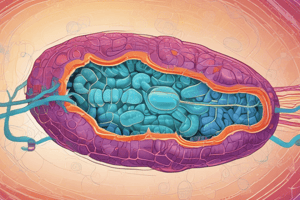Podcast
Questions and Answers
Which of the following is a gluconeogenic precursor?
Which of the following is a gluconeogenic precursor?
- Glycogen
- Glucose
- Pyruvate (correct)
- Fructose
Which hormone primarily acts to increase blood glucose levels?
Which hormone primarily acts to increase blood glucose levels?
- Glucagon (correct)
- Insulin
- Epinephrine
- Cortisol
What is the role of insulin in glucose metabolism?
What is the role of insulin in glucose metabolism?
- Promotes glucose uptake by cells (correct)
- Inhibits glucose uptake
- Increases glycogen breakdown
- Stimulates gluconeogenesis
During fasting, which organ primarily synthesizes glucose?
During fasting, which organ primarily synthesizes glucose?
Which of the following represents a property of gluconeogenesis?
Which of the following represents a property of gluconeogenesis?
Which of these compounds can be converted to glucose during gluconeogenesis?
Which of these compounds can be converted to glucose during gluconeogenesis?
What is the main effect of epinephrine on glucose levels?
What is the main effect of epinephrine on glucose levels?
Which statement is true about the enzymes involved in gluconeogenesis?
Which statement is true about the enzymes involved in gluconeogenesis?
How many ATP equivalents are consumed in the gluconeogenesis process for one molecule of glucose?
How many ATP equivalents are consumed in the gluconeogenesis process for one molecule of glucose?
Which of the following enzymes catalyzes the first step in synthesizing phosphoenolpyruvate?
Which of the following enzymes catalyzes the first step in synthesizing phosphoenolpyruvate?
What is the net yield of ATP equivalents produced during glycolysis?
What is the net yield of ATP equivalents produced during glycolysis?
Which molecule can serve as a precursor for glucose biosynthesis?
Which molecule can serve as a precursor for glucose biosynthesis?
What is the role of Fructose 1,6-bisphosphatase in gluconeogenesis?
What is the role of Fructose 1,6-bisphosphatase in gluconeogenesis?
How does the enzyme Phosphoenolpyruvate Carboxykinase vary between species?
How does the enzyme Phosphoenolpyruvate Carboxykinase vary between species?
Which characteristic best describes the reaction catalyzed by phosphofructokinase-1 in glycolysis?
Which characteristic best describes the reaction catalyzed by phosphofructokinase-1 in glycolysis?
What is produced along with glucose during gluconeogenesis?
What is produced along with glucose during gluconeogenesis?
What is the final product of gluconeogenesis in most cases?
What is the final product of gluconeogenesis in most cases?
What role does glucose 6-phosphatase play in glucose metabolism?
What role does glucose 6-phosphatase play in glucose metabolism?
Which transporter moves glucose 6-phosphate from the cytosol to the endoplasmic reticulum?
Which transporter moves glucose 6-phosphate from the cytosol to the endoplasmic reticulum?
Which of the following is NOT a major gluconeogenic precursor in mammals?
Which of the following is NOT a major gluconeogenic precursor in mammals?
After conversion to which compound does glycerol enter the gluconeogenesis pathway?
After conversion to which compound does glycerol enter the gluconeogenesis pathway?
What is the primary location for glucose 6-phosphatase activity in cells?
What is the primary location for glucose 6-phosphatase activity in cells?
Which metabolic reaction involving glucose 6-phosphatase is characterized as metabolically irreversible?
Which metabolic reaction involving glucose 6-phosphatase is characterized as metabolically irreversible?
Which enzymes comprise the complex that includes glucose 6-phosphatase?
Which enzymes comprise the complex that includes glucose 6-phosphatase?
What is the primary enzyme responsible for glycogen breakdown?
What is the primary enzyme responsible for glycogen breakdown?
What conversion occurs in muscle cells following glycogenolysis?
What conversion occurs in muscle cells following glycogenolysis?
Where do vertebrates primarily store glycogen?
Where do vertebrates primarily store glycogen?
What is the role of phosphoglucomutase in glycogen metabolism?
What is the role of phosphoglucomutase in glycogen metabolism?
What happens to glucose 6-phosphate in liver cells after glycogenolysis?
What happens to glucose 6-phosphate in liver cells after glycogenolysis?
What initiates the polymerization reaction during glycogen synthesis?
What initiates the polymerization reaction during glycogen synthesis?
How is muscle glycogen visualized under electron microscopy?
How is muscle glycogen visualized under electron microscopy?
What is the product of glycogen breakdown during glycogenolysis?
What is the product of glycogen breakdown during glycogenolysis?
What type of reaction does glycogen synthase perform?
What type of reaction does glycogen synthase perform?
Which enzyme is crucial for converting cellular glucose into G6P?
Which enzyme is crucial for converting cellular glucose into G6P?
Which hormones are known to regulate glycogen metabolism?
Which hormones are known to regulate glycogen metabolism?
What effect does insulin have on glycogen phosphorylase?
What effect does insulin have on glycogen phosphorylase?
In which condition is glucagon primarily secreted by the pancreas?
In which condition is glucagon primarily secreted by the pancreas?
What role does glycogen serve in muscle cells?
What role does glycogen serve in muscle cells?
Which transporter does insulin increase to facilitate glucose transport into tissues?
Which transporter does insulin increase to facilitate glucose transport into tissues?
Which type of reaction involves the enzyme remaining bound to the growing chain?
Which type of reaction involves the enzyme remaining bound to the growing chain?
Flashcards are hidden until you start studying
Study Notes
Gluconeogenesis Overview
- The gluconeogenesis pathway shares steps with glycolysis but has four unique reactions necessary for converting non-carbohydrate precursors into glucose.
- It serves to synthesize glucose when liver glycogen is depleted after 16-24 hours of fasting, primarily utilizing lactate and alanine as precursors.
- Major gluconeogenic sites include the liver, kidneys, and small intestine, which export glucose into the bloodstream for body utilization.
Key Enzymes and Intermediates
- Pyruvate Carboxylase: Catalyzes an irreversible reaction; activated by acetyl CoA. Converts pyruvate to oxaloacetate.
- Phosphoenolpyruvate Carboxykinase (PEPCK): Produces phosphoenolpyruvate from oxaloacetate using GTP in animals.
- Fructose 1,6-bisphosphatase: Converts fructose 1,6-bisphosphate to fructose 6-phosphate in a reversible reaction analogous to glycolysis.
- Glucose 6-phosphatase: Hydrolyzes glucose 6-phosphate to glucose, facilitating its release into the bloodstream.
Energy Considerations
- Glycolysis: Consumes 2 ATP but produces 4 ATP and 2 NADH, yielding a net gain of 2 ATP equivalents.
- Gluconeogenesis: Requires 6 ATP equivalents and 2 NADH to synthesize one glucose molecule.
Hormonal Regulation
- Blood glucose levels are regulated by hormones, primarily insulin, glucagon, and epinephrine.
- Insulin:
- Secreted by pancreatic β-cells; promotes glucose uptake in muscle/adipose tissue via GLUT 4.
- Stimulates glycogen synthesis and enhances phosphoprotein phosphatase-1 activity, inhibiting glycogen phosphorylase.
- Glucagon:
- Secreted by pancreatic α-cells in response to low blood glucose; stimulates hepatic glycogenolysis for glucose release.
- Epinephrine: Also regulates glucose mobilization, especially during stress or during physical exertion.
Regulation of Gluconeogenesis
- Gluconeogenesis is regulated through hormonal signals and energy status within the cell, with opposing regulatory mechanisms in glycolysis.
- The pathway includes not just synthesis but also the signaling mechanisms that dictate when to produce or break down glucose.
Precursors for Gluconeogenesis
- Major precursors: lactate, alanine, and glycerol (from triacylglycerol breakdown).
- Glycerol is converted to dihydroxyacetone phosphate to enter gluconeogenesis.
Glycogen Metabolism
- Glycogen serves as a storage form of glucose; its degradation (glycogenolysis) produces glucose 1-phosphate, which converts to glucose 6-phosphate for metabolic processes.
- Glycogen Phosphorylase: Catalyzes glycogen breakdown to glucose 1-phosphate; in liver cells, it converts to free glucose for blood glucose regulation.
- Glycogen Synthase: Key enzyme for glycogen synthesis, adds glucose units and is regulated by hormonal signals.
Conclusion
- The regulation of gluconeogenesis and glycogen metabolism is crucial for maintaining glucose homeostasis in mammals, highlighting the interplay of various enzymes and hormones in energy balance.
Studying That Suits You
Use AI to generate personalized quizzes and flashcards to suit your learning preferences.




